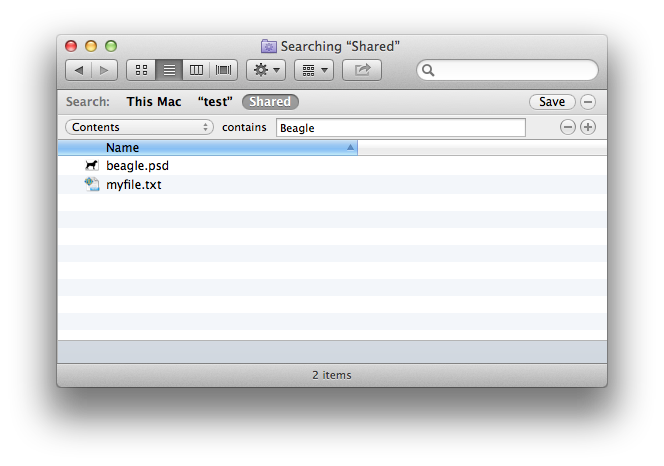Spotlight
Overview
Starting with version 3.1.0, Netatalk supports file indexing on AFP shared volumes that can be searched by macOS Spotlight.
This feature uses a backend that is built on a metadata store, indexing and search engine provided by Gnome LocalSearch (previously: Gnome Tracker.)
See the Developers Readme for technical documentation and implementation notes.

Spotlight allows you to search both for file names as well as file contents.
Using Tracker commandline tools on the server
Netatalk must be running, commands must be executed as root and some environment variables must be set up.
If the .tracker_profile file does not exist, create it first. If you need to make the environment variables persistent, source .tracker_profile from /root/.profile. If needed, adjust PREFIX to point to the base directory Netatalk is installed to, and replace “/var” with the localstate directory configured at compile time.
$ su
# cat .tracker_profile
PREFIX="/usr/local"
export XDG_DATA_HOME="$PREFIX/var/netatalk/"
export XDG_CACHE_HOME="$PREFIX/var/netatalk/"
export DBUS_SESSION_BUS_ADDRESS="unix:path=$PREFIX/var/netatalk/spotlight.ipc"
# . .tracker_profile
#
When using Tracker from OpenCSW you must also update your PATH:
# export PATH=/opt/csw/bin:$PATH
Troubleshooting
If you are seeing an error like this when you try to interact with tracker:
Could not connect to Tracker: Failed to load SPARQL backend: Could not open journal for writing, Permission denied
Please make sure you have the environment variables set up as described above.
Common Tracker commands
Querying Tracker status:
# tracker daemon
Stop Tracker:
# tracker daemon -t
Start Tracker:
# tracker daemon -s
Reindex directory:
# tracker index -f PATH
Query Tracker for information about a file or directory:
# tracker info PATH
Search Tracker:
# tracker search QUERY
Advanced Tracker command line configuration
Tracker stores its configuration via Gnome dconf backend which can be modified with the command gsettings.
Gnome dconf settings are per-user settings, so, as Netatalk runs the Tracker processes as root, the settings are stored in the root user context and reading or changing these settings must be performed as root and Netatalk must be running (and again the environment must be set up as shown above).
# gsettings list-recursively | grep Tracker
org.freedesktop.Tracker.Writeback verbosity 'debug'
...
The following list describes some important Tracker options and their default settings.
org.freedesktop.Tracker.Miner.Files index-recursive-directories
This option controls which directories Tracker will index. Don’t change this option manually as it is automatically set by Netatalk reflecting the setting of the spotlight option of Netatalk volumes.
org.freedesktop.Tracker.Miner.Files enable-monitors true
The value controls whether Tracker watches all configured paths for modification. Depending on the filesystem modification backend (FAM on Linux, FEN on Solaris), this feature may not work as reliable as one might wish, so it may be safer to disable it and instead rely on periodic crawling of Tracker itself. See also the option crawling-interval.
org.freedesktop.Tracker.Miner.Files crawling-interval -1
Interval in days to check the filesystem is up to date in the database, maximum is 365, default is -1. -2 = crawling is disabled entirely, -1 = crawling may occur on startup (if not cleanly shutdown), 0 = crawling is forced
Footnotes
This is a mirror of the Netatalk GitHub Wiki
Last updated 2026-02-14